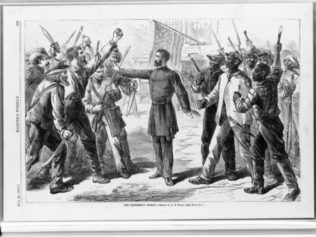For a man who, amazingly, has yet to open his mouth and ask an actual question during his 23 years on the Supreme Court, Justice Clarence Thomas knows how to drop verbal bombs when he does decide to say something to the public.
This time, Thomas rendered many across the nation speechless when he told college students in Florida that race was not an issue when he was growing up in the segregated South in the 1960s.
“My sadness is that we are probably today more race- and difference-conscious than I was in the 1960s, when I went to school. To my knowledge, I was the first Black kid in Savannah, Georgia, to go to a white school. Rarely did the issue of race come up,” Thomas said during a chapel service hosted by the nondenominational Christian institution, Palm Beach Atlantic University in West Palm Beach.
“Now, name a day it doesn’t come up,” he said. “Differences in race, differences in sex, somebody doesn’t look at you right, somebody says something. Everybody is sensitive. If I had been as sensitive as that in the 1960s, I’d still be in Savannah. Every person in this room has endured a slight. Every person. Somebody has said something that has hurt their feelings or did something to them — left them out.”
Thomas went on to say, “The worst I have been treated was by Northern liberal elites – the absolute worst I have ever been treated. The worst things that have been done to me, the worst things that have been said about me, by Northern liberal elites, not by the people of Savannah, Georgia.”
While most African-Americans who have lived in the North can attest to the more thinly veiled racism and discrimination Blacks there might face, it was Thomas’ claims about the lack of race-consciousness in the segregated South that had jaws dropping all across the country.
“Right. But maybe the reason race came up so rarely was not that the racial situation was better in 1960s Georgia. Maybe the reason race came up rarely is that the racial situation in 1960s Georgia was extremely terrible,” Jonathan Chait wrote in New York magazine. “For instance, for the first 14 years of Thomas’s life, Georgia had zero African-Americans in its state legislature. Majority-Black Terrell had a total of five registered Black voters — possibly because African-Americans were so satisfied with their treatment that they didn’t see any reason to vote, or possibly because civil-rights activists in Georgia tended to get assassinated. So maybe ‘reluctance to bring up racial issues’ is not, in fact, the best measure of a society’s racial health.”
In the New York Times, columnist Charles Blow asks “whether Thomas is being amnesiac in his recollections or if he was contemporaneously oblivious.”
“Either way, being unable to acknowledge and articulate the basic fact that race was — and remains — a concern for others is disturbing,” Blow writes. “The second thing: Is he suggesting that we essentially stay silent and suck it up? Would that be an admirable strategy for overcoming oppression? It isn’t. This would be a particularly unsettling concept coming from a sitting justice who should be able to apply proper perspective to plaintive grievance and understand broad, societal circumstances.”


